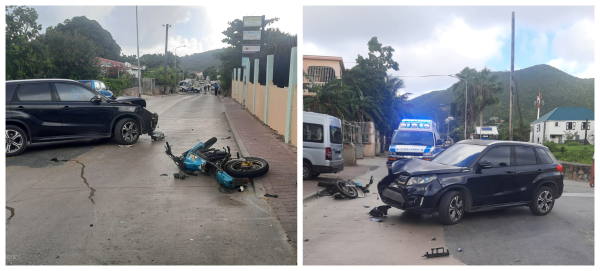PHILIPSBURG:--- Sint Maarten's electricity and water tariffs are under intense scrutiny, with two recent evaluation reports offering conflicting analyses and recommendations. One report, prepared by the Regulatory Authority of Curaçao (RAC) and Bureau Telecommunication and Post (BTP), calls for significant regulatory reform and tariff restructuring. The other, a review of the RAC/BTP report by Reporting, Controlling and Regulatory Consulting (RCRC) on behalf of the utility company GEBE, raises alarms about the potential financial consequences of the proposed changes. A close comparison reveals key inconsistencies in their findings, methodologies, and core recommendations.
Divergent Methodologies and Core Assumptions
A primary point of conflict lies in how each report approaches the evaluation. The RAC/BTP report adopts a classic regulatory stance, focusing on cost causality and consumer protection. It methodically dissects the tariff formulas, concluding that the current system lacks transparency and results in consumers being overcharged. The report operates on the assumption that tariff components should directly and accurately reflect the costs they are meant to cover.
Conversely, the RCRC report argues that the RAC/BTP's approach is biased from the start, claiming its objective was pre-determined "to determine whether the fuel component can be reduced." RCRC’s analysis prioritizes the financial stability of the utility provider, GEBE. It contends that while the current tariff structure may be flawed, a cross-subsidy exists between different components. It warns that reducing one part of the tariff without a corresponding increase elsewhere would jeopardize GEBE's financial health.
The Fuel Clause: A Tale of Two Interpretations
The calculation of the fuel clause—a key component of consumer bills—is a central point of disagreement.
- RAC/BTP Finding: The report finds a cumulative surplus of approximately 12.6 million guilders in the fuel clause for electricity over three years (2022-2024). It argues that the formula incorrectly allocates the cost of electricity used for water production to all electricity consumers, effectively making them pay for a component of the water service.
- RCRC Rebuttal: The RCRC report acknowledges the surplus but attributes it to an outdated yet legally standing 1979 Ministerial Decree governing the water fuel clause. It asserts that the RAC/BTP's conclusion of "double charging" is based on a misunderstanding of this decree. While agreeing the decree is obsolete, RCRC warns against hastily removing the electricity cost for water production from the electricity tariff, estimating it would create an annual revenue shortfall of 9.2 million guilders for GEBE.
Recommendations on Non-Revenue Electricity (NRE)
Both reports agree that Non-Revenue Electricity (NRE)—power lost in transmission or due to theft—needs to be addressed in the tariff calculation. However, they differ on how it should be applied.
- RAC/BTP Recommendation: Proposes that the current fixed 8.5% NRE rate should be replaced with a dynamic, monthly calculation based on actual performance. This would create an incentive for the utility to improve efficiency.
- RCRC Counterpoint: Argues against a dynamic NRE rate, emphasizing the need for predictability in consumer tariffs. RCRC recommends maintaining a constant, fixed NRE norm to avoid volatile monthly price fluctuations for customers.
The Path Forward: Reform vs. Caution
The two reports present starkly different paths for the future of Sint Maarten's utility tariffs. The RAC/BTP report is a call for immediate and comprehensive reform, advocating for independent regulatory oversight, formula restructuring to ensure fairness, and a review of the deep cross-subsidies between commercial and domestic water users.
The RCRC report, while acknowledging inefficiencies, urges extreme caution. It frames the issue as one of financial sustainability, suggesting that any changes must be part of a holistic, integral cost-of-service study. Its core message is clear: altering one part of the complex and interconnected tariff system without understanding the full financial impact could lead to unintended and severe consequences for the utility provider.
Ultimately, these conflicting reports highlight a fundamental tension in utility regulation: balancing consumer fairness and tariff transparency with the operational stability of the sole provider. The divergence in their findings underscores the complex decisions facing Sint Maarten's policymakers as they navigate the critical task of structuring fair and sustainable utility rates.
 PHILIPSBURG:--- Preliminary investigation indicates that the motorcyclist was traveling on A.Th. Illidge Road coming from the Tata Bus Driver roundabout towards Madrid Road. At the same time, the driver of the Suzuki Vitara was traveling on Nazareth Road towards A.Th. Illidge Road. While attempting to make a left turn onto A.Th. Illidge Road, the driver of the Vitara failed to give right of way. As a result, the motorcycle collided with the right front side of the Vitara.A
PHILIPSBURG:--- Preliminary investigation indicates that the motorcyclist was traveling on A.Th. Illidge Road coming from the Tata Bus Driver roundabout towards Madrid Road. At the same time, the driver of the Suzuki Vitara was traveling on Nazareth Road towards A.Th. Illidge Road. While attempting to make a left turn onto A.Th. Illidge Road, the driver of the Vitara failed to give right of way. As a result, the motorcycle collided with the right front side of the Vitara.A Caribbean Region:--- Only one week remains to enter EPIC’s first-ever
Caribbean Region:--- Only one week remains to enter EPIC’s first-ever